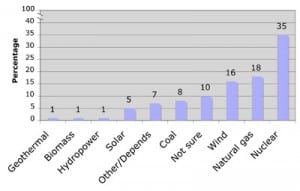Legal & Regulatory
-
Legal & Regulatory
Will Nuclear 2.0 Be Better, Faster, and Cheaper than Nuclear 1.0?
The nuclear renaissance has been in play for several years yet not a shovel of dirt has been turned. Why should anyone believe that Nuclear 2.0 will be an improvement?
-
Legal & Regulatory
FERC Proposes an Improved Path for New Transmission
In October of last year, the North American Electric Reliability Corp. (NERC) issued a study finding that maintaining electric reliability will require significant acceleration in the siting and construction of new transmission lines. The NERC study is indicative of growing concerns that changes to the current transmission planning process are necessary to maintain reliability and accommodate interconnection of the massive amounts of renewable resources expected to come online over the next 10 to 20 years.
-
Legal & Regulatory
Climate Change: Avoid Political Thickets
A federal judge recently dismissed a lawsuit in which the plaintiffs alleged that defendants’ production of chemicals and electricity had “added to the ferocity of Hurricane Katrina.” The judge’s reasoning reveals the inherent limitations of courts unilaterally initiating policies to address climate change issues.
-
Legal & Regulatory
TREND: Fire Safety Again Tops Nuclear Agenda
The U.S. Nuclear Regulatory Commission puts fire at the top of its safety concerns, calculating that fire constitutes half of all reactor safety risks, and lately fire safety has again become a major industry issue. For example . . .
-
Legal & Regulatory
Regulators Embrace Nuclear—Awkwardly
A recent survey finds utility regulators contradicting themselves on the touchy subject of nuclear power. They say they like new nukes, but their actions belie their stated beliefs.
-
Legal & Regulatory
Energy Storage: Renewables’ Necessary Partner
Timing is everything in the world of electric power generation. The timing of the delivery of electricity is affected by both the users’ demand and the speed with which a variety of energy sources supply power to the transmission system. Modern grids require reliable energy sources to instantly meet the needs of their users.
-
Legal & Regulatory
Defining the Elephant: Smart Grid Status Check
There is no doubt that the year-plus since passage of the American Recovery and Reinvestment Act of 2009 (Recovery Act) has borne witness to a great deal of activity among the diverse groups of smart grid stakeholders.
-
Legal & Regulatory
Rethinking Revenue Assurance for Utilities
Should utilities take a new look at their approaches to maximizing profit margins?
-
Legal & Regulatory
Gridlock Continues for Grid Policy
Early last year, there were promising signs that electric transmission line construction would be facilitated by the convergence of the new administration’s emphasis on developing remote renewable generation resources, proposed legislative provisions expanding federal siting authority, and the granting by the Federal Energy Regulatory Commission (FERC) of generous cost-of-service returns on such investments. However, the stars did not align for transmission policy in 2009 as had been hoped, and the forecast is cloudy.
-
Legal & Regulatory
Electric Vehicles: The Uncertain Road Ahead
"Diversify, diversify, diversify." That has long been the mantra of many Wall Street pundits when advising investors on how to weather the risks of the stock market. Now advocates of electric vehicles (EVs) are using this same logic to champion plug-in hybrid electric vehicles (PHEVs).

